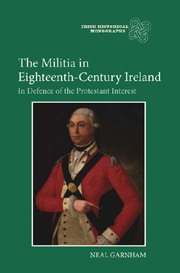Book contents
- Frontmatter
- Contents
- Preface
- Acknowledgments
- Abbreviations
- Introduction: Militia issues
- 1 To 1691: Precursors
- 2 1692–1716: Establishment
- 3 1716–59: Maintenance
- 4 1760: Action
- 5 1761–69: Reform Debated and Attempted
- 6 1769–78: Reform Achieved
- 7 1778–82: Volunteering Ascendant
- 8 1782–85: Fencible Men and the Militia Reconsidered
- 9 1785–93: Indecision and an Act
- 10 Conclusions
- Bibliography
- Index
7 - 1778–82: Volunteering Ascendant
Published online by Cambridge University Press: 05 February 2013
- Frontmatter
- Contents
- Preface
- Acknowledgments
- Abbreviations
- Introduction: Militia issues
- 1 To 1691: Precursors
- 2 1692–1716: Establishment
- 3 1716–59: Maintenance
- 4 1760: Action
- 5 1761–69: Reform Debated and Attempted
- 6 1769–78: Reform Achieved
- 7 1778–82: Volunteering Ascendant
- 8 1782–85: Fencible Men and the Militia Reconsidered
- 9 1785–93: Indecision and an Act
- 10 Conclusions
- Bibliography
- Index
Summary
The Militia Act of 1778 was the product of the Patriot opposition in the House of Commons. Militia reform had been a concern of this group for almost twenty years. The act ultimately passed into law, however, only because it had become acceptable to the government in London, where previous opposition to militia reform had been overcome by the need to establish a force that would be capable of strengthening Irish defences during the war and of maintaining internal security at a time when the regular army garrison was being depleted.
In the meantime the people had taken matters into their own hands. In the wake of the growing threat of invasion or a possible rising, and even before the Militia Act passed, one observer reckoned that there were almost nine thousand men ‘already armed in independent companies’. Traditionally this rush to the colours began on St Patrick's Day 1778 in the town of Belfast. Such actions were nothing new. Various emergencies over the previous half century had seen Irish Protestants mobilise themselves. The obvious similarities to former crises and the reactions of the Protestant population were not lost on contemporaries, who saw the rush of men to arm themselves for their own defence as comparable to events in 1745, or simply as the Protestants of the country arming themselves ‘without waiting on the usual commissions’. The difference was that under the old militia legislation such volunteers could be legitimised, even retrospectively, by the issuing of royal commissions.
- Type
- Chapter
- Information
- The Militia in Eighteenth-Century IrelandIn Defence of the Protestant Interest, pp. 101 - 122Publisher: Boydell & BrewerPrint publication year: 2012



